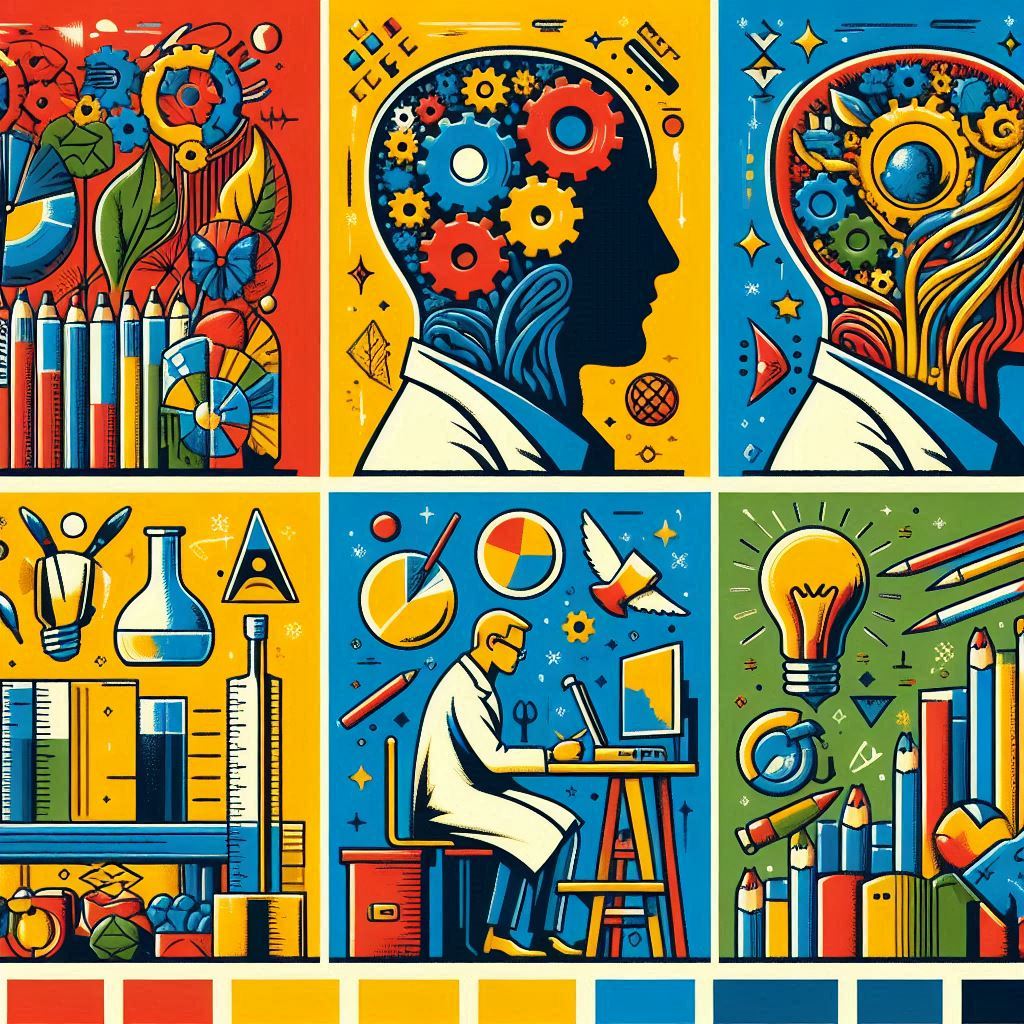Examples of Analytical Thinking Made Easy
Are you finding it hard to approach problems in a logical and systematic way? Don’t worry, analytical thinking can be simple! Break down complex issues into smaller, manageable parts. This will help you develop a clearer and more effective approach to problem-solving.
In this article, we’ll explore real-life examples of easy analytical thinking to help you sharpen your skills and confidently tackle challenges.
Understanding Analytical Thinking
What Is Analytical Thinking?
Analytical thinking involves breaking down complex information into components and understanding their connections. It requires in-depth search, data analysis, problem-solving, and decision-making.
This higher-order thinking skill is important in problem-solving and decision-making because it allows individuals to systematically process information and identify key patterns, trends, and relationships.
Doctors use analytical thinking to diagnose patients by carefully analyzing symptoms and test results in the medical field.
Civil engineers use analytical thinking to design and build bridges, considering various factors such as load, materials, and environmental conditions.
In the research process, scientists apply analytical thinking to analyze data and draw conclusions.
These real-world examples illustrate how analytical thinking is applicable across various industries and is important for problem-solving and decision-making.
Enhancing Your Career with Analytical Skills

The Significance of Analytical Skills in the Workplace
Analytical skills are very important at work. They help people solve problems and make good decisions. These skills also help with understanding complex information and finding important patterns. This is crucial for business growth and innovation in different industries.
We can demonstrate analytical skills when applying for a job or during work by using technical abilities like data analysis, logical thinking, and good communication. We can also discuss situations in which our analytical skills have helped solve a problem in the past.
Analytical thinking is used in different fields in the real world. For example, engineers use it to design strong bridges, doctors use it to diagnose illnesses, and researchers use it to make new discoveries. To succeed in our careers, we should use analytical thinking in decision-making, keep learning, and improve our problem-solving skills.
Examples of Analytical Thinking in Different Industries
Analytical thinking is used to build bridges. Engineers use logic and data to design efficient structures.
Data analysis is important in many industries. It helps identify patterns and trends in large data sets to make informed decisions.
In the medical field, critical analysis is crucial for diagnosing and treating patients. Medical students must use problem-solving skills and thorough research to make accurate conclusions.
These examples show how analytical thinking is important for problem-solving and decision-making in different industries.
Demonstrating Analytical Thinking

How to Showcase Analytical Thinking on Your Job Application
When applying for a job, it’s important to show your ability to think analytically. One way to do this is by giving examples of how you solved problems and made decisions in past jobs. You can also talk about specific times when you used your analytical skills. It’s important to include both technical skills, like data analysis and logical thinking, and soft skills, like communication and creativity, to show that you have a well-rounded set of analytical abilities.
When writing your resume, use action words and show the results of your work using numbers. Also, show how you used analytical thinking in different situations, like in building bridges, in medical school, or research, to demonstrate that your skills can be used in different fields. By highlighting your analytical thinking in your job application, you can show employers that you’re good at solving problems and making decisions.
Technical vs. Soft Analytical Skills: Demonstrating Both
Individuals can demonstrate technical and soft analytical skills in the workplace. They can combine data analysis with creative and logical thinking. Data analysis can help in decision-making, and logical thinking can lead to problem-solving.
For example, a marketing analyst can use data analysis to identify customer trends and develop a new marketing strategy.
Individuals should provide practical examples to show these skills on a resume or in job interviews. They can describe how they used analytical skills in previous roles to achieve positive outcomes. For instance, they can explain how they used data analysis to identify a market opportunity and then create a strategic plan to capture it.
These combined skills can lead to career success. They enable individuals to bring a holistic approach to problem-solving and decision-making, adding value to their organization.
For example, an engineer with strong technical problem-solving skills and creative thinking can efficiently troubleshoot complex issues and offer innovative solutions for career advancement.
Crafting an Analytical Skills-Driven Resume
On a resume, it’s important to show analytical thinking skills. This means giving real examples of your skills, like data analysis, logical thinking, and problem-solving. You should also highlight your experiences using these skills in past jobs or school projects. In job interviews, talk about how you’ve used analytical skills in the past and give examples of how it helped in your work. This will show your ability to think analytically in a professional setting.
Illustrating Analytical Competency During Job Interviews
Individuals may use analytical thinking when facing complex problems in previous job positions. They evaluate and dissect the issue, analyze data, think logically, and conduct thorough research to identify potential solutions.
For example, a project manager may have used analytical thinking to assess a decline in productivity within their team. They examined factors such as communication breakdowns and resource allocation and then implemented a solution to address the issue effectively.
During job interviews, candidates approach analytical thinking situations by providing specific examples of how they’ve used this skill to solve problems and make decisions in the past.
An effective approach would be to showcase a time when the candidate utilized analytical thinking to gather and analyze information, identify a problem, and propose a solution in a professional setting. For instance, a marketing specialist could explain how they analyzed market data to create a successful advertising campaign.
To showcase analytical competency during job interviews, candidates may use strategies such as providing real-world examples of how their analytical thinking skills positively impacted a previous employer.
By effectively communicating the value of analytical competency, potential employers will understand how the candidate’s analytical skills can contribute to their organization’s success.
This could involve discussing, for instance, how in-depth data analysis and creative problem-solving led to cost-saving measures or process improvements in a prior role.
The Roadmap to Advanced Analytical Skills

Assessing and Recording Your Current Skill Level
There are ways to assess and record one’s analytical thinking skills.
For example, individuals can use self-assessment tools like online quizzes and surveys to understand their problem-solving and reasoning abilities. Tracking performance in analytical tasks like data analysis and decision-making can also offer practical insights.
Additionally, seeking feedback from peers, mentors, or supervisors can provide a comprehensive view of strengths and areas for improvement.
Measuring and documenting analytical skills in a work setting involves using various performance indicators. This can include completing complex tasks, efficient problem-solving, and consistently demonstrating critical thinking ability. Maintaining a portfolio of work examples and garnering positive recognition from colleagues or superiors can also be valuable evidence of analytical skills.
Individuals can use resources like online courses, workshops, and seminars focused on analytical thinking development to track progress in enhancing analytical skills. Self-help materials and mentorship from experienced professionals can offer valuable guidance.
Additionally, using online platforms and apps for skill tracking and goal-setting can help individuals improve their analytical thinking abilities.
Expanding Your Network to Foster Analytical Thought
Expanding your professional network can help you think analytically. You will be exposed to different perspectives and problem-solving approaches, which will help you learn new strategies for interpreting data and making decisions.
Connecting with people from diverse industries and backgrounds can give you unique insights and solutions to complex problems. For example, working with engineers can teach you analytical thinking in bridge building, and collaborating with medical professionals can offer insights into patient care and research.
Seeking opportunities to engage with a diverse network of professionals can help you grow your analytical thinking skills and gain valuable insights into problem-solving across different fields.
Seizing Opportunities for Skill Development
Individuals can improve their analytical thinking skills by seeking learning experiences that involve problem-solving, data analysis, and logical reasoning. These can include engaging in research projects, participating in case studies, and taking on challenging tasks at work. Real-world examples in structural engineering, medical research, and business analysis show how honing analytical thinking abilities can lead to innovative problem-solving and decision-making processes.
Real-World Examples of Analytical Thinking

Bridge Construction in STEM Education
Incorporating bridge construction into STEM education helps teach critical thinking and problem-solving. Students design, build, and test their own bridges. They identify weaknesses and make adjustments, promoting analytical thinking. This hands-on approach encourages creativity, teamwork, and communication. It also provides practical applications of math and physics concepts. Engaging in bridge construction helps students understand engineering principles and gain transferable skills.
It requires them to break down complex problems, analyze data, and make informed decisions, essential workforce skills.
Critical Analysis in Medical Training
Critical analysis is vital in medical training and education. It helps break down complex information, understand connections, conduct research, analyze data, solve problems, and make informed decisions. These skills are crucial in the field of medicine.
Critical analysis is important in research for identifying trends and drawing meaningful conclusions to advance medical knowledge. In medical school, students learn to think logically, conduct exams, and develop accurate diagnoses and treatment plans through critical analysis.
Conducting In-Depth Research
Conducting in-depth research in a specific field or industry involves using different steps and methods to ensure accurate and reliable information. This includes gathering data, analyzing it, and understanding relevant information.
Data analytics and creative thinking can enhance the depth of research in a specific area. For instance, advanced statistical tools can show valuable insights and trends, while innovative thinking lets researchers explore new perspectives and approaches. These methods are constructive in industries like healthcare, education, or technology, where in-depth research is crucial for solving complex issues and creating effective solutions.
The Role of Data Analytics in Decision-Making
Data analytics is important for making decisions in professional settings. Analyzing large data sets helps organizations find patterns, trends, and insights, which helps them make better decisions. Data analytics has benefits like improved accuracy, forecasting, and informed risk management. But it’s important to consider potential drawbacks.
Businesses and individuals can use data analytics to improve decision-making. They can do this by investing in data analysis tools, creating a data-driven culture, and offering employee training. Making data-based decisions helps organizations stay competitive, work more efficiently, and meet customer needs. Individuals can also make better decisions in their professional and personal lives by using data analytics.
Innovative Thinking in Omnichannel Strategies
Innovative thinking can enhance omnichannel strategies. This can be done by analyzing customer data from various touchpoints. The insights can then create personalized and seamless experiences across channels.
For example, a company can use customer data to identify patterns and preferences. This allows them to tailor marketing messages and product recommendations to each individual.
Businesses can leverage analytical thinking to improve their omnichannel strategies. This involves using data analysis to identify areas for optimization and make data-driven decisions.
Analyzing customer behavior across different channels, identifying bottlenecks in the customer journey, and refining processes can improve the overall customer experience.
Levels of Analytical Prowess

The Five Proficiency Tiers of Analytical Thinking
The five proficiency tiers of analytical thinking are:
- Data analysis.
- Logical thinking.
- Research.
- Creativity.
- Communication
You can assess and record your current skill level in analytical thinking by:
- Evaluating your ability to break down complex information
- Searching for in-depth connections
- Analyzing data
- Problem-solving
- Making decisions
To foster analytical thought and skill development, you can:
- Network and engage in conversations with individuals from diverse backgrounds
- Seek out mentors
- Attend workshops and seminars focused on analytical thinking
Leveraging Analytical Thinking for Success

Individuals can improve their career growth and success by using analytical thinking. This means breaking down complex information into smaller parts and understanding how they connect. By doing this, professionals can find new solutions to problems. They also need to focus on critical thinking, logical reasoning, and data analysis, essential in solving real-world issues like business, science, and engineering.
To demonstrate analytical thinking in job applications and interviews, professionals should give specific examples of their skills, such as data analysis, logical thinking, research, creativity, and communication. They can also demonstrate their technical and analytical skills through hands-on examples.
Professionals should assess their current analytical thinking skills and seek feedback from supervisors, peers, or mentors to improve them. They can also participate in training programs, workshops, or online courses to develop these skills further and use them in their work.

Vizologi is a revolutionary AI-generated business strategy tool that offers its users access to advanced features to create and refine start-up ideas quickly.
It generates limitless business ideas, gains insights on markets and competitors, and automates business plan creation.


